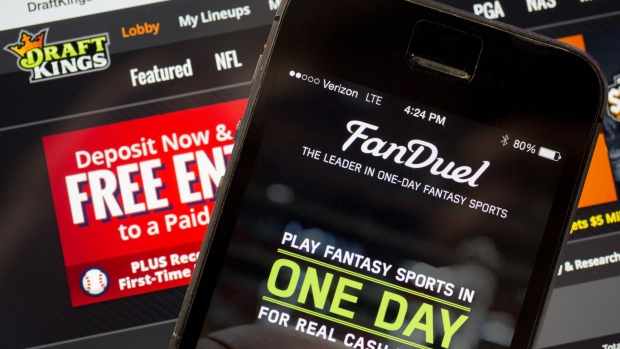Nov 8, 2019
How this Canadian company is making waves in the burgeoning mobile sports-betting industry
, BNN Bloomberg
NBA Commissioner Silver Favors Regulated Sports Betting
There is a lot of money ready to flow into the emerging legal single-event sports betting industry in North America, but regulations and a robust illicit market are making it difficult in some places.
Last May, the U.S. Supreme Court struck down a ban on single-game betting, which opened up the flood gates for gaming companies like FanDuel Group and DraftKings, not to mention eager bettors. And while red tape remains a challenge for this industry in Canada, one Canadian company is finding a way to get a piece of the pie.
Score Media & Gaming Inc. — better known as theScore — could become the leading Canadian player in this space, according to one analyst.
“The biggest hurdle is acquiring customers, but theScore already has them,” said Nikhil Thadani, a technical analyst at Mackie Research Capital, in a telephone interview. “In theory at least, if theScore can cross-convert their existing users, or at least a decent proportion of them to sports betting, the business model should be a lot more interesting.”
The Toronto-based company, which sold its television asset nearly a decade ago, and has since seen its sports news app become one of the most popular in North America, launched a new app in September in New Jersey — where mobile sports betting is permitted — called theScore Bet. It allows users to make a bet on any single game in any of the major leagues, with golf and tennis being added in the near future. TheScore has deals to expand to a dozen other states in the coming years.
“We’re moving into a space that’s just opened up, but we’re absolutely not moving away from media,” said John Levy, founder and chief executive officer of theScore, in a telephone interview. “We’ve always treated sports betting as a natural reason why people love sports. Our media app is going to continue to be the powerhouse that it is, but we’re going to infuse sports betting.”
Presently, the two apps work together a lot like Facebook and Facebook Messenger, said Levy. A user can scroll through the media app for news and scores, but if they want to place a bet, due to regulations, they’re transferred to a different app.
However, theScore is far from the only company taking bets in the U.S. More recently-founded betting providers like FanDuel and DraftKings, which made their names in daily fantasy sports, are also busy striking deals to offer single-event betting in different states.
North America’s big sports leagues are also making deals in this sector, with the National Basketball Association recently announcing a multiyear deal with DraftKings to become an official sports betting operator, making it one of several companies that has the rights to official betting data. But theScore insists it isn’t facing resistance from any of the leagues.

The FanDuel Inc. app and DraftKings Inc. website are arranged for a photograph in Washington, D.C., U.S. (Bloomberg)
“All the leagues are pretty on board now,” said Levy. “They know sports betting is good for their league or for their team. Not to mention, there’s also an opportunity for them to participate in some of the revenue.”
Meanwhile, in Canada, legislation is still preventing companies from facilitating sports-betting operations there.
“We’ve had legal sports betting in Canada for decades,” said Paul Burns, the Canadian Gaming Association’s President and CEO, in a telephone interview, referencing provincial products like Pro-Line. “But you have to bet on the outcome of more than one event, due to a restriction in the criminal code that we’d all like removed.”
The provision in the Criminal Code Burns is referring to, under section 202, is one that prohibits single-event wagering. But even if that is struck down, sports wagering, like the lottery, is under provincial jurisdiction.
But bettors are finding a way around these federal restrictions, said Burns. His association says Canadians are placing up to $4 billion dollars’ worth of bets per year through offshore sites that do allow single-game wagering, but the big culprit, much like in the cannabis sector, is the black market. An estimated $10 billion dollars a year is being wagered through local book making operations which are mainly run by organized crime, according to the CGA.
Still, Thadani thinks theScore has a leg up on its U.S. competitors because it’s already a trusted source for news.
“What it comes down to is the stickiness on your platform, and how well you’re able to convert your existing users,” said Thadani, referencing theScore’s claims of having up to four million active quarterly users, many of whom check the app multiple times a day.
“What should be a benefit for them is they shouldn’t have to look too hard to find users, like their competitors will have to.”
Another ace up theScore’s sleeve, says Thadani, is many other online gaming companies have a lot more debt on their balance sheet than theScore. The company’s third-quarter results, released in late October, revealed revenue that jumped 25 per cent compared to last year, but activity from theScore Bet won’t be evident until the company releases fourth-quarter results in January.
Ultimately, for Levy, Canada is the icing on the cake, but he says with federal legislation standing in the way, whether his company will be permitted to operate a sports-betting operation in the country remains to be seen.






